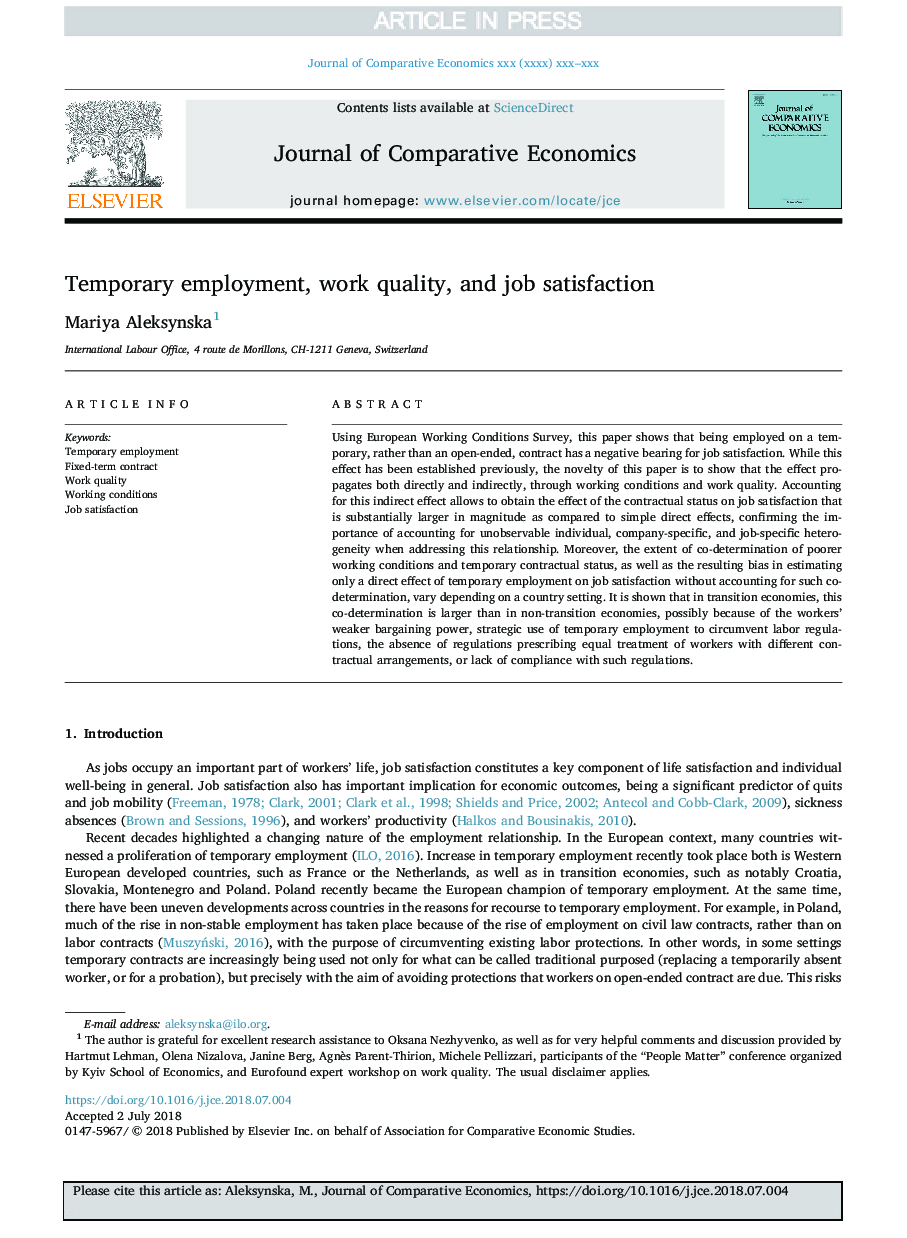| کد مقاله | کد نشریه | سال انتشار | مقاله انگلیسی | نسخه تمام متن |
|---|---|---|---|---|
| 10153663 | 1666220 | 2018 | 14 صفحه PDF | دانلود رایگان |
عنوان انگلیسی مقاله ISI
Temporary employment, work quality, and job satisfaction
ترجمه فارسی عنوان
اشتغال موقت، کیفیت کار و رضایت شغلی
دانلود مقاله + سفارش ترجمه
دانلود مقاله ISI انگلیسی
رایگان برای ایرانیان
کلمات کلیدی
اشتغال موقت، قرارداد ثابت، کیفیت کار، شرایط کاری، رضایت شغلی،
ترجمه چکیده
با استفاده از نظرسنجی شرایط کار اروپایی، این مقاله نشان می دهد که داشتن قرارداد موقت، به جای یک قرارداد باز، منفی برای رضایت شغلی منفی است. در حالی که این اثر قبلا ایجاد شده است، نوآوری این مقاله نشان می دهد که اثر به طور مستقیم و غیر مستقیم از طریق شرایط کاری و کیفیت کار منتشر می شود. حسابداری برای این اثر غیرمستقیم اجازه می دهد تا تأثیر وضعیت قراردادی بر رضایت شغلی را که در مقایسه با اثرات مستقیم ساده است، به میزان قابل ملاحظه ای افزایش دهد، تأیید اهمیت حسابداری برای عدم انطباق نا مشخص، شرکت و خاص خاص در هنگام رسیدگی این رابطه علاوه بر این، میزان تعیین هماهنگی شرایط کار ضعیف و موقتی قراردادی موقتی و همچنین تعصب ناشی از آن در برآورد فقط تأثیر مستقیم اشتغال موقت در رضایت شغلی بدون حسابداری برای چنین تصمیمی، بسته به نوع کشور متفاوت است. نشان داده شده است که در اقتصادهای در حال گذار، این همبستگی بزرگتر از اقتصادهای غیرتهاجمی است، احتمالا به علت قدرت خرید شغلی ضعیف کارگران، استفاده استراتژیک از اشتغال موقت به منظور دور زدن قانون کار، عدم وجود مقرراتی که از رفتار برابر با کارگران استفاده می کند با قراردادهای مختلف قراردادی و یا عدم انطباق با چنین مقررات.
موضوعات مرتبط
علوم انسانی و اجتماعی
اقتصاد، اقتصادسنجی و امور مالی
اقتصاد و اقتصادسنجی
چکیده انگلیسی
Using European Working Conditions Survey, this paper shows that being employed on a temporary, rather than an open-ended, contract has a negative bearing for job satisfaction. While this effect has been established previously, the novelty of this paper is to show that the effect propagates both directly and indirectly, through working conditions and work quality. Accounting for this indirect effect allows to obtain the effect of the contractual status on job satisfaction that is substantially larger in magnitude as compared to simple direct effects, confirming the importance of accounting for unobservable individual, company-specific, and job-specific heterogeneity when addressing this relationship. Moreover, the extent of co-determination of poorer working conditions and temporary contractual status, as well as the resulting bias in estimating only a direct effect of temporary employment on job satisfaction without accounting for such co-determination, vary depending on a country setting. It is shown that in transition economies, this co-determination is larger than in non-transition economies, possibly because of the workers' weaker bargaining power, strategic use of temporary employment to circumvent labor regulations, the absence of regulations prescribing equal treatment of workers with different contractual arrangements, or lack of compliance with such regulations.
ناشر
Database: Elsevier - ScienceDirect (ساینس دایرکت)
Journal: Journal of Comparative Economics - Volume 46, Issue 3, September 2018, Pages 722-735
Journal: Journal of Comparative Economics - Volume 46, Issue 3, September 2018, Pages 722-735
نویسندگان
Mariya Aleksynska,
